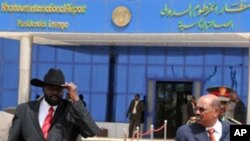A leading member of Sudan’s ruling National Congress Party (NCP) said leaders in the neighboring countries will soon meet to help resolve all outstanding issues involving the 2005 Comprehensive Peace Agreement (CPA), ahead of next month’s referendum.
Rabie Abdelati Obeid told VOA leaders of countries that share borders with Sudan have expressed concern that the outcome of the 9th January referendum could have negative consequences, not only on Sudanese, but also on their peoples.
“This is to pave the way and to shorten the differences between (the) SPLM (Sudan People’s Liberation Movement) and NCP, and guarantee that the coming period will be peaceful, and to achieve the goals and the objectives of the CPA signed in the year 2005.”
Libyan leader Muammar Gaddafi, Egyptian President Hosni Mubarak, Sudanese leader Omar Hassan al-Bashir, as well as southern Sudanese leader Salva Kiir, are expected to meet soon to resolve “tensions and controversies” surrounding full implementation of the CPA.
“The Egyptian leader and the Libyan president feel that the future of Sudan will be in danger and they are afraid that the results of the referendum will create a lot of difficulties for Sudan and for the neighboring countries as well. That is why I think this initiative is very important because I think what will affect Sudan will affect southern Sudan and affect Libya, as well as Egypt,” said Obeid.
Both the SPLM and the dominant NCP have traded accusations about what they described as gross violations of the 2005 agreement that ended the country’s two decades of civil war.
Obeid said, despite accusations, the NCP is committed to the full implementation of the CPA.
“The commitment of the NCP is still as it is that the NCP will work up to the last moment for achieving unity. Even the presidents of Egypt and Libya, both of them believe in the benefit and the good output of unity, because, if we compare between unity and secession actually, the negative effect of secession are too much as compared to unity.”
Meanwhile, Sudan's president says the country will adopt an entirely Islamic constitution if the south splits away after a referendum next month.
In a speech Sunday, President Bashir said that, if the south breaks away, his government will change the constitution and that, in his words, there will be no question of cultural or ethnic diversity. He said Sharia, or Islamic law, will be the main source for the constitution and that Arabic will be the official language.
Sudan's interim 2005 constitution implemented Sharia in the north, but also recognized the “cultural and social diversity of Sudanese.”





